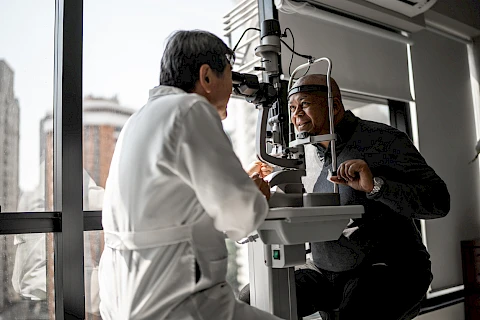
Clouding of the lens is common among those in their golden years, leading to hazy or blurred vision. They can make everyday tasks challenging and significantly impact the quality of life. Support for caregivers is essential when assisting a senior with cataracts. This includes understanding the condition, aiding with daily tasks, and guiding through treatment and recovery.
Cataracts: Learning, Diagnosing, and Managing
Lens degeneration, a clouding of the eye's lens, can significantly impact vision and daily life. Recognizing the symptoms and understanding treatment options is crucial for maintaining independence and safety. Common symptoms of this condition include:
- Cloudy or blurred vision
- Difficulty seeing at night
- Increased sensitivity to light and glare
- Seeing halos around lights
- Frequent changes in eyeglass or contact lens prescription
Diagnosis and Treatment
Cataracts are diagnosed with eye exams and regular check-ups that aid early detection. Early lens degeneration may be managed with glasses, but surgery—replacing the cloudy lens with an artificial one—is often the most effective.
Living With Clouding of the Lens
Making home adjustments improves life quality for those with cataracts. Improve lighting, use blinds or curtains to reduce glare, and offer magnifying glasses. Caregivers can help with reading, writing, and grooming. Ensuring clear pathways and using contrasting colors can create a safer environment.
Preparing for Surgery
Preparing a senior with cataracts for surgery involves several steps. For pre-operative considerations, there are:
- Medical evaluations: Ensure all pre-surgery tests and check-ups are completed.
- Discuss medications: Talk to the doctor about which medications to continue or stop before surgery.
- Arranging transportation: Plan for someone to drive the older adults to and from the surgery center.
On surgery day, expect a straightforward procedure. The doctor will provide post-surgery instructions, including using prescribed eye drops and avoiding strenuous activities.
Post-Operative Care
Caring for a golden-ager after surgery is crucial for a smooth recovery. As for post-surgery care, consider these:
- Managing discomfort: Use prescribed medications to manage any pain or discomfort.
- Eye protection and hygiene: Follow the doctor's instructions for using eye shields and keeping the eye clean.
- Follow-up appointments: Ensure the elderly loved ones attend all scheduled follow-ups to monitor healing.
- Monitoring vision changes: Watch for unusual changes and report them to the doctor.
- Resuming normal activities: Gradually help them return to their routines, avoiding heavy lifting or straining.
We Help Support Older Adults With Cataracts
Assisting a senior with cataracts means comprehending the condition and modifying everyday activities. Supporting older adults from diagnosis to recovery, especially in lens degeneration, is essential for caretakers to enhance their quality of life. If you need personalized support, contact Senior Helpers St. Charles. We proudly serve St. Charles, St. Peters, Chesterfield, and Jefferson County. Let us help make this journey more accessible for you and your loved one.